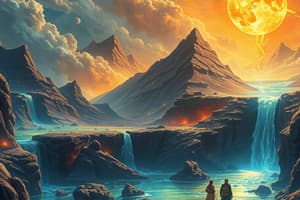Podcast
Questions and Answers
What is the type of mechanical weathering caused by the expansion of the upper portion of a block intrusive igneous rock?
What is the type of mechanical weathering caused by the expansion of the upper portion of a block intrusive igneous rock?
- Chemical Change
- Thermal Expansion and Contraction
- Unloading (correct)
- Physical Change
Physical change alters the chemical composition of an object.
Physical change alters the chemical composition of an object.
False (B)
What is the result of the variation between temperatures on rocks?
What is the result of the variation between temperatures on rocks?
Rocks crack
High temperature causes rock to ______________, while low temperature causes rocks to ______________.
High temperature causes rock to ______________, while low temperature causes rocks to ______________.
Which of the following is an example of chemical change?
Which of the following is an example of chemical change?
Chemical weathering is common for places that experience extreme swings in daily temperatures.
Chemical weathering is common for places that experience extreme swings in daily temperatures.
What is the result of physical change on an object?
What is the result of physical change on an object?
The expansion of the upper portion of a block intrusive igneous rock is caused by the ______________ pressure from the bottom of the block and the exposed strata.
The expansion of the upper portion of a block intrusive igneous rock is caused by the ______________ pressure from the bottom of the block and the exposed strata.
Match the following types of weathering with their characteristics:
Match the following types of weathering with their characteristics:
Chemical change is a type of physical change.
Chemical change is a type of physical change.
Flashcards are hidden until you start studying
Study Notes
Chemical Weathering Processes
- Oxidation is a process where oxygen bonds with other elements from rock-forming minerals, forming more stable substances, lower in energy, and with a larger volume and more distinct color.
- It commonly occurs to metals present in rocks, such as aluminum and iron, forming aluminum and iron oxides.
- Solution is the chemical process of dissolving rock-forming minerals in water, where mineral-forming ions are dissociated and carried away in water.
- Carbonation is the chemical weathering process that decomposes rocks through the aid of water and carbon dioxide, commonly occurring in rocks containing carbonates (CO) such as limestone.
- Hydrolysis is the process where water molecules alone react with rock-forming minerals, forming new products, and is different from hydration.
Factors Affecting Weathering Rate
- Rock structure affects the rate of weathering, with highly jointed/fractured rocks disintegrating faster than a solid mass of rock.
- Topography affects the rate of weathering, with physical weathering occurring more quickly in highly elevated areas with steep slopes.
- Time length of exposure to agents of weathering affects the rate of erosion, with parts of rock boulders that are exposed being more susceptible to weathering.
Differential Weathering and Erosion
- If a landscape contains a variety of rocks, some rocks are more susceptible to weathering and some are more resistant.
- Susceptible rocks undergo weathering faster and rock fragments are transported through the process of erosion.
Types of Mechanical Weathering
- Unloading is the type of mechanical weathering caused by the expansion of the upper portion of a block intrusive igneous rock.
- Thermal Expansion and Contraction is the type of mechanical weathering caused by high temperatures causing rock to expand and low temperatures causing rocks to contract, leading to cracking.
Physical and Chemical Change
- Physical change refers to changes limited to the physical attributes or appearance of an object without changing its chemical composition.
- Chemical change is the type of change that involves changes in its chemical composition and the formation of new products.
Studying That Suits You
Use AI to generate personalized quizzes and flashcards to suit your learning preferences.




